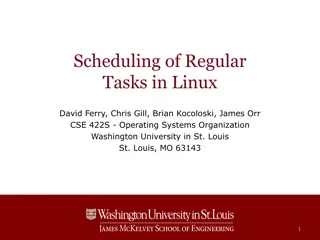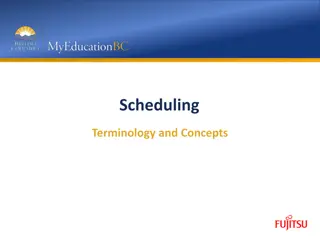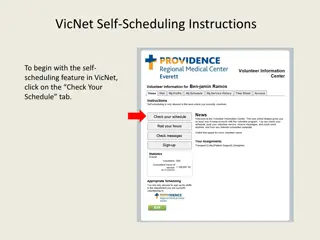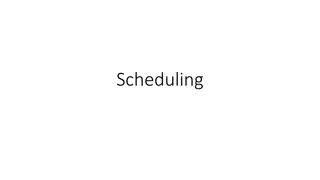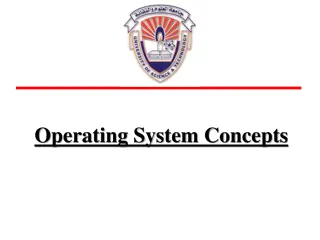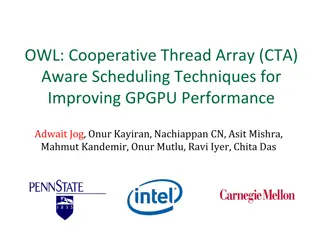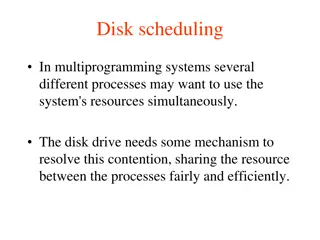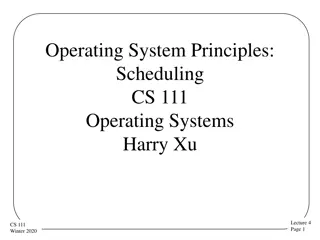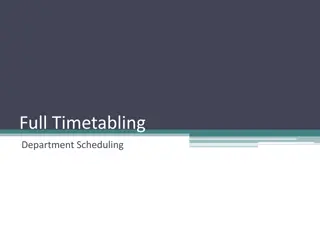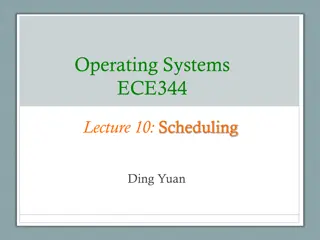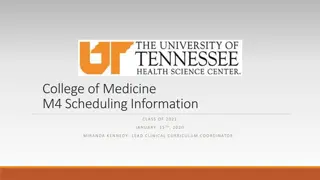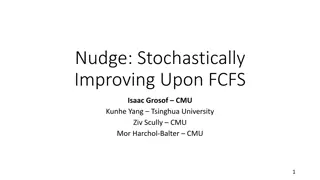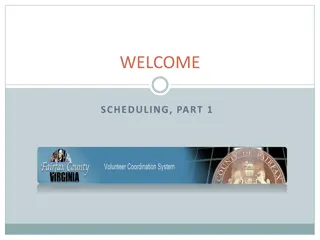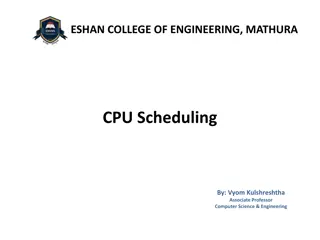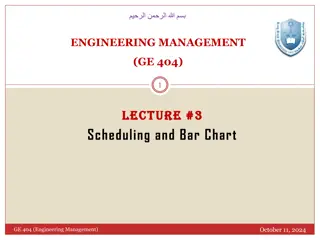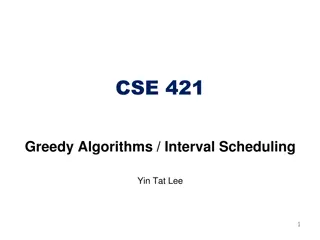
Detailed Instructions for TESS Meeting Session Conveners
Learn about the responsibilities of session conveners, guidelines for scheduling sessions, and the approval process for abstracts at the 2018 TESS Meeting. Contact abstracts@agu.org for general inquiries.
Download Presentation

Please find below an Image/Link to download the presentation.
The content on the website is provided AS IS for your information and personal use only. It may not be sold, licensed, or shared on other websites without obtaining consent from the author. If you encounter any issues during the download, it is possible that the publisher has removed the file from their server.
You are allowed to download the files provided on this website for personal or commercial use, subject to the condition that they are used lawfully. All files are the property of their respective owners.
The content on the website is provided AS IS for your information and personal use only. It may not be sold, licensed, or shared on other websites without obtaining consent from the author.
E N D
Presentation Transcript
Thank you for choosing to convene a session at the 2018 TESS Meeting. Please review the detailed instructions on scheduling your session. If you have any questions regarding during the process, please direct general questions to abstracts@agu.org. If you have any questions related your session allocations, the content or scientific nature of the abstracts submitted to your session, the contact information for all Scientific Organizing Committee Members can be found at here. Scheduling Your Session Once the abstracts have been submitted, your role as session convener is to assist the Program Committee to organize and schedule your approved session(s). You will propose a session schedule using the online scheduling system. Proposed session schedules must be entered into the system no later than Wednesday, 7 March at 23:59 EST. Access to the scheduling system will not be available after this date. The scheduling system will include the number of oral and poster session allocations your session proposal has been assigned by the TESS Scientific Organizing Committee. Allocations cannot be changed. If you have any questions regarding your assigned allocations, please contact the Committee representative to discuss. 2
Session Information Conveners are responsible for reviewing all abstracts submitted to their session. Conveners do not have the authority to reject an abstract. If an abstract is not appropriate for the session, the convener may preliminarily reject the abstract and recommend its rejection to the appropriate organizing committee member. Session conveners can only propose a session outline for approval by the Scientific Organizing Committee. The Scientific Organzing Committee has the final approval for scheduling all abstracts and sessions for the meeting. This includes the day, time, type of session, and abstracts within the session. Each session must include the following information, and be entered in the scheduling system o Session Chairs (Sessions may have two (2) Session Chairs in addition to the four (4) Conveners). Current Session Conveners may also serve as Session Chairs o Sequence of abstract presentations o Length of presentations (oral sessions only); Standard oral presentation length is 15 minutes; however you determine the length of each oral presentation. The scheduling system will include the number of oral session rooms and poster allocations the session has been assigned. Session conveners must not provide information to authors regarding session schedules or presentation type (oral or poster). Please do not relay or guarantee information to authors about sessions regarding type of presentation, duration, date, or other scheduling-related matters. These decisions will be approved and finalized by the Scientific Organizing Committee. 3
The Scientific Organizing Committee has the final authority to make adjustments to all proposed schedules in order to ensure the success of the meeting plan. Adjustments may include: o Moving papers to alternative sessions to avoid scheduling conflicts o Changing the duration of presentations o Changing the type of session o Rejecting inappropriate abstracts Once sessions are scheduled by the Organizing Committee, they cannot be rescheduled or changed in any way. Oral Sessions: An oral session is 90 minutes in length with NO breaks. Half sessions or 40 minute sessions have been awarded in specific cases designated by the Organizing Committee. Number of Presentations: It is recommended that a typical oral session contains six (6) papers; however, you may schedule the presentations in your session in different formats, so long as the presentation does not exceed the 90 minute limit. Presentation Time: As with the number of presentations, you may schedule the presentations in your session in different formats. For sessions with the recommended six (6) papers, the standard time for a contributed presentation is 15 minutes (12 minutes presentation time plus 2 minutes discussion time and 1 minute transition time to the next speaker). Invited presentations may be given longer presentation times. The total time allocated to invited authors may not exceed one-half of the total session time. Poster Sessions: A standard poster session should contain roughly 25 papers. Poster sessions are scheduled 1000h-1100h and 1530h-1630h. Posters remain up for the entire day they are scheduled. 4
The tutorial provides you with step-by-step instructions on the scheduling process. You must complete the selection of the two Session Chairs for each session before accessing the abstracts. Step 1: Search for and select two (2) Session Chairs (the Primary or Co-Conveners can also be added as session chairs) Step 2: Update session descriptions as needed (descriptions will be published) Step 3: Transfer abstracts to additional poster or oral sessions as needed Step 4: Arrange sequence/order of abstract presentations and durations for oral sessions if needed. Step 5: Add non-paper events such as opening/closing remarks, discussion and Q&A if necessary (not required). 5
To access the 2018 TESS Scheduling Tool, go to: https://agu.confex.com/agu/2018tess/gateway.cgi On the login page, enter the email address and password associated with your AGU universal account. If you have forgotten your password, click the link to reset your password. 6
Once logged in, you will be directed to the User Portal page. Click on the tab My Account will provide you with the list of sessions you have been allocated. The session type, Oral or Poster appears in parenthesis after the session title. Under the header Session Proposal Primary Convener click on the session title to access the session details for the session you will arrange. You must first select Session Chairs before accessing the abstracts. Please note: all abstracts are currently included in the Poster session. If you have been allocated an additional oral and/or poster session, you will need to transfer the abstracts as needed to the other session(s) you have been allocated (please see instructions on transferring abstracts on page 11). 7
The Session Control Panel appears on the left side of each page in the scheduling process. Upon selecting a session title, you will automatically be placed on the People step. You must complete the selection of two Session Chairs beforeaccessing the abstracts via the Arrange link which will appear after all steps are completed. During scheduling, please utilize the Control Panel to update: People: Search for and add two (2) Session Chairs Session Description: Update the session description if needed (not required). ARRANGE ABSTRACTS (Link will not display until Chairs are selected) Print: Print/view individual abstracts Arrange: Utilize to view, transfer and complete the sequence of abstract presentations with allocated sessions OPTIONS View Submission: Print individual session proposals User Portal: Return to session list to view/arrange additional allocated sessions Abstract Viewer: Access public session viewer Non-Paper Events: Add welcome and/or closing remarks, panels, etc. to session schedule HELP Report a Technical Issue: Utilize to report any technical errors found 8
Adding Session Chairs Step 1: Each session proposal MUST have at least two (2) Session Chairs in addition to the Session Conveners added before viewing or scheduling the abstracts. You will need to complete this step for EACH session allocated. Select two (2) Session Chairs who will be onsite at the meeting to chair the session. You may select an existing Convener to serve as a Chair by clicking on the blue arrow under the Roles column and selecting the additional role of Chair. Select Add Another Person to search for a person that is NOT an existing convener on the session. As a reminder, there is a limit of four (4) Session Conveners, including the Primary Convener. Click on the Continue link to save selections and move to the Session Description step to edit if needed. **WARNING ** DO NOT DELETE ANY EXISTING CONVENERS FROM THE SESSION. IF YOU DO SO THEY WILL NO LONGER HAVE ACCESS TO SCHEDULE ABSTRACTS IN THE SYSTEM AS A CONVENER. 9
Editing Session Description Step 2: Edit the session description if needed. If you have no changes to the session description, click Save to move forward.. If you have been allocated more than one session (i.e. oral and poster), you must edit the descriptions for each individual session. 10
PLEASE NOTE: ALL ABSTRACTS WILL APPEAR UNDER THE SESSION THAT HAS BEEN MARKED AS A POSTER SESSION. IF YOU HAVE BEEN ALLOCATED AN ADDITIONAL ORAL AND/OR POSTER SESSION, YOU WILL NEED TO TRANSFER THE ABSTRACTS TO THE ADDITIONAL SESSIONS THAT YOU HAVE BEEN ALLOCATED. STEP 3 and 4: Click on Arrange under Abstracts on the Session Control Panel to access the list of abstracts submitted to transfer abstracts and arrange the sequence of abstracts. The Arrange option will not appear until the Session Chairs have been assigned. Order Within Group: arrange the sequence of abstracts in the session by updating the number in the box. This will be the order of presentations in the session. Scheduling: For oral sessions, individual presentations will be given a default time of 15 minutes. The individual presentation times can be changed Invited Authors: Invited presentations cannot exceed one half of the total session time. Transfer: select to transfer abstract to an additional oral and/or poster session you have been allocated Additional Fields (see next page) Oral/Poster Allocation: The designation of an Oral or Poster session appears after the session title. Duration/Special Duration: Oral sessions are defaulted to 15 minutes presentations. You may change the default or update oral presentations individually. Poster sessions do not require durations. Preferred Format: Indicates if author chose to be assigned to an Oral or Poster or chose Poster Requested Only. DO NOT SCHEDULE A POSTER ONLY REQUEST IN AN ORAL SESSION WITHOUT OBTAINING THE AUTHORS PERMISSION. If permission is obtained please include that in the notes to Program Committee box. Invited: If the abstract is Invited, a check box will appear the Invited column as well as before the abstract title. Scheduling Notes: If there is a scheduling request by the author it will appear immediately below the abstract title. Scheduling requests are not guaranteed. Preliminary Rejection: if you want to reject an abstract or if you are recommending the abstract to be transferred to another session, contact your Committee representative. 11
Click on the abstract title to view all abstract details. If there are any scheduling notes from the author they will appear under the abstract. 12
To transfer an abstract to an additional oral and/or poster session you have been allocated: Select the abstracts you want to transfer (you may select multiple abstracts) and then scroll down to the bottom of the abstract list. From the drop down menu select the session title of the additional oral or poster session that you have been allocated to transfer abstracts. Once the session is complete and scheduled, check Update to save all selections including sequence order and transfers You may include any comments or requests to the Scientific Organizing Committee by adding them to the Comments for Program Chair . Please note scheduling requests cannot be guaranteed. Contact your Committee representative if you would like to reject or transfer an abstract to another session. Click the Update button to save all selections. 13
Adding Non-Paper Events STEP 5: You may add other 'non-paper' events to this session such as welcome, closing remarks, discussion, Q&A, panel, etc. Simply check (or 'un-check') the box in front of any predefined non-paper event. Enter the title of other custom event(s) in the freeform event box(es). To eliminate a custom event, return to the step and simply erase that title from the freeform event box. Click the Update button to save and either select the Arrange view to return to the abstract list or Full Menu Options from the Session Control Panel to access any other sessions you have been allocated. 14
Technical Support Click on Report a Technical Issue on the Control Panel at any time during the scheduling process to report a technical issue or ask for assistance. You may attach one file when submitting a request for technical support. For example, attaching a screen shot of an error message. 15

